|

Sunflower at garden's edge. Whitley Co., KY.
(*photo
credit)
March 1, 2010 Garden for Economic Reasons
Over the past few years
these daily reflections have offered every conceivable reason for gardening --
from personal reasons (spirituality, physical exercise, psychological health,
and food security) to community reasons (role model, education, neighborly
relations, ecological management and resource conservation). We often neglect
the economics for the gardener's household -- the savings in food purchases due
to available, organic, fresh local produce.
Selection is
important. Those who begin to garden will generally sow and plant what they
like best. However, they soon learn that local, traditionally home-grown crops
are lower priced at the very time that their own garden crops are ready to
harvest. Why use valuable, limited garden space for growing sweet corn when
neighbors do a better job on more land? At the very time, summer greens may be
high priced at local stores or farmers' markets. Decide to grow these instead.
Variety of
vegetables and herbs is a savings. If we grow only beans, they will come on
at one time and we will soon tire of eating them, and so give them away or
preserve them in some fashion -- all good uses. However, if we were to plant
fewer beans and use the same ground for twenty additional varieties of
vegetables and herbs, we would tire less and find variety in summer. Try to
think ahead to having a thirty-variety garden this year. It does take planning
and extra work.
Extending the
growing season is another planning agenda item. If everyone in a family of
four were to eat a daily salad from fresh, home-grown ingredients, savings could
amount to at least $1,500 per year. The big "if" includes actually growing
veggies and herbs throughout the year either in a cooperating climate, in a
sufficient greenhouse, or under temporary seasonal coverings to protect the
selected plants. Some autumn crops cannot submit to winter's winds and chill;
others, such as collards and many existing root crops, can remain or thrive in
moderate winter months.
Preservation of
surplus is too obvious to discuss, and yet can be the most neglected
planning item. When the neighborhood is full of summer produce this year, it
will be difficult to conceive of the end of the production -- and yet thrift
calls for drying, pickling, canning, freezing or bringing materials to the root
cellar. Going beyond the daily fresh salad includes some main-meal dishes of
preserved surplus. Additional food savings will soon accrue. Surpluses extend
home-grown vegetable dishes to non-growing times. Ultimate savings cannot be
figured, for time spent in the garden includes recreation, mental health and
other good and non-monetary values.
Prayer:
Teach us Lord to be a saving people and to regard this as part of our ultimate
respect for our God-given resources.

Carduus nuttans, European introduced species,
now invasive exotic plant.
(*photo
credit)
March 2, 2010 Accept
Responsibility and Unintended Consequences
A basic principle of
any moral treatment of wrongdoing is that the act is more than something purely
individual, as though consequences end only with me or you. Instead,
everything we do is social and even cosmic to some degree, -- our good or evil
deeds. Thus even when the wrongdoing is inadvertent, it is still a reality that
hurts the total environment in which we live and interact. We seek forgiveness
and restitution for personal misdeeds; we as responsible beings recall that
social consequences also require restitution and reconciliation with God. We
may be sorry for exploiting a resource in a polluting manner but merely
expressing sorrow does not end the process; the aftereffects must be remedied
and damages repaired.
Such satisfaction
for past wrongdoing is part of the "indulgence" battles of past centuries in the
Church but, unlike cap-and-trade policy (the permission to pollute). Those
suggested or prescribed good works were for wrongdoing already performed (not as
a few environmental spokespersons grossly misinterpret to be a false medieval
"permission to sin"). In fact, by accepting a correct theological stance
(restitution for past mistakes) the spokespersons could improve arguments for
refraining from polluting, due to overlooked consequences already showing
themselves in climate change. A correct theological and historical
interpretation is that there are broader and often hidden effects of the
misdeeds that we perform, and we become painfully aware of these with time. We
enjoy smoking or driving while drinking and yet lung cancer or wrecks could and
often do result -- and their consequences must be reckoned with.
Unintended
consequences may even occur when "greenish" folks demand biofuels, and forget
that rainforests are being destroyed for plantations to supply the palm oil, or
that orangutan habitat may be destroyed. Some strive to solve global warming
through seeding oceans with iron filings or emitting massive amounts of vapor
into the atmosphere; further research may discover that unintended ill-effects
(e.g. reduction in rainfall in a critical area) may result. Our actions are
global in scope. I was once asked about a pressured air device to unplug
clogged drains and told the manufacturer that young children could sit upon it
and the blast up their rump could kill them; the device was never marketed.
Recall that Thomas Fairchild, a nurseryman and devout Christian, feared God's
wrath, because he tinkered with nature by cross- pollinating sweet Williams with
carnations and producing the world's first human-produced hybrid. (The
Brother Gardenerss by Andrea Wulf pp. 6-7). We may chuckle about Fairchild's
scrupulosity, but still regard his respect as worth preserving.
Prayer: Lord,
teach us to be more aware of the consequences of our actions, and be willing to
repair the damage done by us and by others of our human family with whom we take
some responsibility.

Tender wild greens make tasty fresh
salad.
(*photo
credit)
March 3, 2010
Create a Different Salad Every Day
I
delayed discussing this venture until now because it could have possibly petered
out with time and lack of ideas. It seems harder to create a daily new salad
than it was to carry out last year's venture of a daily soup (see Special Issues
for "A Different Soup Every Day"). In preparation one must contend with
high-priced winter salad ingredients (though I still hold my food bill to the
average food stamp recipient's allotment and share it with an Indian orphan's
food bill). Refusing to purchase or prepare meat products eliminates the
possibility for home-made ham, chicken and turkey salads. Furthermore, these
winter salads require fresh foods, often from distant places; and cold winds,
ice and snow, and no greenhouse, make this an added burden.
I did start the New
Year with the very last of the fall garden (twelve veggies from among the
leaves: garlic, broccoli, collard, turnip, and radish greens, kale, mustard,
spinach, Brussels sprouts, carrot, and a sprig of surviving dill and sprout of
kohlrabi). The next day's salad was the surviving outside greens plus dandelion
and indoor parsley. Immediately afterwards we had a streak of very cold weather
that ruined much of this surviving garden. However, this change of events
generated a New Year's resolution to create a better all-weather garden in 2010.
Why different
salads? The basic thesis for different soups is that one can live with
nutrition, local production and low cost in mind and eat in a rather healthy way
with variety -- the spice of life. The challenge came from a veteran health
care person who said I would have to resort to the regular Appalachian fare of
cornbread and beans -- certainly a mainstay of my first economy- year, 2008.
However, the soups were possible even though some were variations on the basic
ingredients of vegetable soups. Some ways to meet the challenge of variety
salad ingredients are:
* Gardening --
We can grow veggies in a backyard garden for about nine months of the year with
special care in early spring planting, summer watering, and autumn frost
protection.
* Wild-gathering
-- We have basic wild greens (poke, dandelion, and many others) as well as
mushrooms, blackberries, persimmons, black walnuts, and many other foods for the
taking. Granted, more congested areas are less blessed with such varieties.
* Preserving surpluses -- Ways include refrigeration, pickling, food
drying, canning and preserving in root cellars. These methods allow the
extension of the salad ingredients beyond the normal growing period, and they
are still nutritious.
* Growing a
variety of herbs -- Those who want the same salad day-after-day will not
enjoy this exercise. Different tastes are more highly valued by some of us.
The good part of a salad is that it need not be the full meal, and thus only a
taste or small quantity may be sufficient for a given day.
Prayer: Lord,
make us enjoy the challenges of living ever more simply so that others may
simply live.

Reflections in a garden pond.
(*photo
credit)
March 4, 2010
Is Hunger a Form of Terrorism?
Confronting hunger
with an empty stockroom can be a form of terrorism -- with all its raw emotion
and trauma. How do we advance food security in a hungry world and do this in a
way to distribute justice to all? On some precious occasions in the past year,
someone has come to my door needing food for his or her family. I feel that
Jesus is visiting me in the form of hungry people, and telling me we cannot be
complacent about sharing food with others. We must recognize that God has done
great things for us -- and we must share with others. Certainly when
opportunities arise, our two parishes have been more than generous, both at
holiday times of the year and when people suffer shortages at the end of the
months or through some form of mishap such as a house fire.
Ethiopia and parts of
the Horn of Africa are suffering from severe drought that is harming livestock
and has led to poor grain and other food harvests. Whether a famine will
develop later this year can not be determined as of this date. However, people
who indulge in waste of food or luxurious consumption of resource- intensive
food materials must reflect on that ultimate question: "Did you feed me when I
was hungry?" Our answer that we did not see the Lord hungry is not sufficient.
For our own salvation we must see the hungry and do something about it.
Otherwise in this sea of hypocrisy we become terrorists.
A simple fact is to
be proclaimed when it comes to food shortages and the resulting hunger: a
person who does not have food tomorrow suffers from a form of terrorism, for to
starve is to be terrorized. We who are sated with access to quantities of food
do not experience this form of terrorism -- only the reaction of the unemployed
and hopeless who regard their own contribution to the world as blowing
themselves up, a desperate message to a world of haves and have-nots.
We can be inadvertent
terrorists and do not hardly admit to it. Our reaction to terrorism is to kill
terrorists by military means. If we hold our cool and look at this
realistically, we find that permitting the commons of the world to be
apportioned to those with power to "possess" and never to take measures to
remove their wanton surpluses and waste is to become a party to terrorism. To
allow a world of greed and waste is to terrorize the poor of the world -- and we
democratic people, both our nation and as individuals, are going to be held
accountable for what we are doing wrong. To waste food or to fail to share our
surpluses is to participate in the total act of terrorizing the one billion
people somewhere in the world today. We do not want to put ourselves into the
shoes of the poor African mother with her hungry brood on a dusty road hoping to
reach a refugee camp. She is terrorized as starvation stares at her -- and we
are all partly to blame.
Prayer: Lord,
help us to promote food security at every level possible, so that when we meet
we can look you in the eye when the final question is asked.
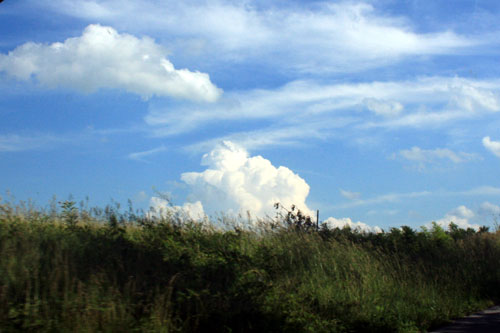
Cloud on the horizon. Washington Co.,
KY.
(*photo
credit)
March 5, 2010
Encourage Green Antinuclear Advocates
On this World Day
of Prayer we ought to pray that the environmental movement stays true to its
commitments and goals -- that the green movement does not yellow into
cowardliness.
Helen Caldicott, Australian
pediatrician and one of the foremost antinuclear activists, comments that she
was essentially ignored at the Copenhagen Conference in December even by many
so-called green movement people. The chance to hear from traditional
antinuclear advocates was virtually nil, because the green movement's organizers
are waffling due to the bombardment of propaganda by the nuclear power
industry. The basic message is that the need for clean energy to combat global
warming includes nuclear power -- and therein many greens are turning yellow.
The argument used by
these wafflers is that nuclear advocates will join forces with them; together
with nuclear industry lobby money, the renewable energy (solar, wind,
geothermal, hydropower and some biofuels) folks and energy conservationists WILL
stop the coal, oil and natural gas interests cold. Look the other way: forget
that nuclear wastes are still to be guarded for thousands of years, that even
low-grade nuclear fuels acquire their own carbon footprint in processing, and
that the expensive powerplants (eight billion dollars or more each) need to be
guarded and maintained properly to avoid serious accidents or terrorist
threats.
Charles Ferguson in
"The Long Road to Zero: Overcoming the Obstacles to a Nuclear-Free World,"
Foreign Affairs, Jan.-Feb., 2010 (pp. 86-94) argues that our efforts to
restrain nuclear weapons proliferation mistakenly includes the encouragement of
nuclear powerplant construction. In essence, this increases the opportunities
for non-nuclear weapons countries to upgrade nuclear materials to the enrichment
levels needed for weapons-grade materials. Instead of containing the
proliferation of weapons this might actually enhance their distribution.
Ferguson comments
that, to displace only one-seventh of the projected greenhouse gas emission
increase by the year 2050, would require one new nuclear powerplant to be
connected to the electrical grid every two weeks. Some critics might quibble
about the size of that projected demand for expensive nuclear power, especially
with the rapid advances of lower-cost wind power between now and then; such a
sizeable nuclear power increase would bear a price tag of over eight trillion
dollars. This sum could instead truly advance renewable energy use by that time
with little or no ill-effects. He also observes that the time lag (about a
decade) demanded to get the nuclear plants into production could be filled with
alternatives installed more quickly. Ferguson concludes that the current
nuclear security agenda will not prevent further nuclear proliferation or stop
terrorists from obtaining fissile materials.
Prayer: Lord,
teach us to move in the direction of zero nuclear materials and to do so
quickly.

Sawdust caught on strands of spider web.
(*photo
credit)
March 6, 2010
Avoid March Madness
Why not write each
year on the madness that affects us in this part of America, when basketball
teams move from tournament game to virtually inevitable loss, for most in a
relatively short time. Is it because we are infected by a disease of late
winter before the season opens to outdoor participative sports? I wish that
were the complete answer, but some people who often go to seed for lack of
regular exercise are the most adamant spectator enthusiasts. Why the screams
and stress that trigger possible heart attacks?
As an advocate of
physical exercise I believe we should all spend one hour a day getting some form
of exercise whether stretching while sitting in a chair, or jogging, or biking,
or using a rowing machine. I applaud those who engage in participative sports
both for their own health and in loyalty to their school or civic group; I
support spectators who cheer on the participants. However, how much exercise
occurs through cheering, or how much participation in sports occurs as a
spectator? Also, when does one in a larger academic institution become a
"professional" for the school's money-making purposes?
Virtually all agree
that there are limits to spectator sports. Rowdy and drunken fans at European
football (soccer) matches are not to be allowed or imitated -- though some
American events are starting to look the same. What about parents who strike
and threaten umpires? These are hardly role models for the youngsters at play.
In fact, the rage of fans is certainly not good for their health or that of
neighbors with weak hearts. Stress is enhanced and not relieved by such high
pressure events -- and yet it is meant for "fun." Is it? Why not cheer good
competitive performance by opposite sides as well as on the part of our favorite
teams? Good spectators ought to applaud the athletic achievements of the
opposite team. Maybe instead, we are all touched by the pressure of the indoor
gym, the tensions of drums pounding and cheerleaders arousing yells from the
partisans who travel distances to urge on their team.
My failure to mention
seasonal madness previously had much to do with entering the spell for my
favorite teams. With older age and less tolerance for seasonal madness, I now
can cheer favorite teams from a distance for a brief moment and then go on with
other issues worth more focus. Maybe too many people engage in modern bread and
circuses -- and prefer the blood of games to that of past warfare. Neither is
worth advocating. Spectators create tense situations through catcalls and boos;
let them get on with some personal physical exercise and leave the sports'
participants to do their own thing among themselves. Having said this, I
confess that our regional teams with high national ranking make me break down
and watch at least some basketball games on the Internet in March.
Prayer: Lord,
teach us to act rationally and not allow even brief periods of sports events to
lead us astray. Make all of us see that spectator sports do not substitute for
physical exercise.
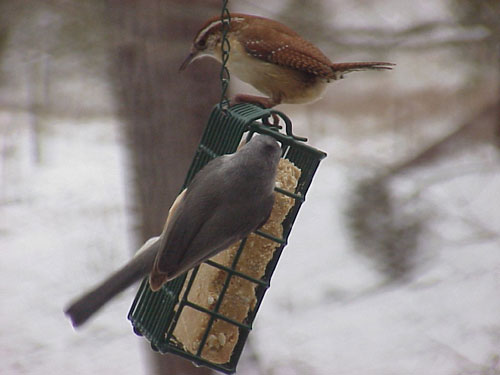
Carolina wren (Thryothorus
ludovicianus) and tufted titmouse (Baeolophus bicolor)
share a nourishing treat.
(*photo by Sally Ramsdell)
March 7, 2010
Learn about the First Missionary
(John 4: 5-42)
Today's story of the
Samaritan woman at the well is a story of someone coming to faith -- a story
that is deeply connected to the Lenten liturgies. Jesus leads all of us and
does not hesitate to meet and converse with those regarded as hostile. Jesus
does not lead his disciples on the traditional detour route around Samaria from
Galilee to Jerusalem. Rather he takes the more direct route, the route similar
to that we must take to spread the Good News.
While the disciples
are off purchasing provisions for the meal, Jesus engages a Samaritan woman who
comes to fetch water at Jacob's well, a watering place for centuries. Again his
directness transfers from travel routes to conversation. Jesus is immediately
able to connect with the Samaritan woman's search by triggering her to ask
questions. He says he has a life-giving water, which will last forever. His
mission is to the marginalized, and to some degree all her Samaritan community
fits this category. Jesus startles her, for he knows her past life; he does
not dwell there but says he is the means to salvation, with no apologies for her
own limited beliefs.
The woman says
she sees he is a prophet and is immediately drawn to the power of Jesus. She
leaves this watering hole to become the first evangelist, the one who takes Good
News, now received with enthusiasm, back to her home community. She does so
with the handicaps of being an imperfect human being, and known as such by her
community. However, she is a person who is deeply sincere and willing to extend
her faith to others. Her message is so convincing that, even amid her known
imperfections, these people follow her back to Jesus. The Samaritan community
hurry to meet Jesus firsthand. They are drawn to Jesus by a magnetic force, the
innate sense of living water that many creatures can smell from a distance. The
local people invite Jesus to come and accept their hospitality, for they thirst
for what he has to offer.
Upon returning, the
disciples are the late learners. They are people with the cultural biases of
the times and have avoided the very persons Jesus finds so easy to talk to. The
disciples are students who will become more perfect missionaries after the
Resurrection and Pentecost. They are astonished that the physical hunger of
Jesus is transcended by a spiritual hunger for an entire world, a field ripe for
the harvest. Doing God's will is food enough for Jesus, and his hope is to
prepare missionaries to extend his zeal by spreading Good News. Some will sow;
some will reap; all are learners who need experience in order to participate in
this cooperative endeavor.
Prayer: Lord,
"I thirst" rings out as a desire to share resources with all people. Remind us
again of the saving waters of Baptism when we dip our fingers in holy water.
Let Lent's traditional "Scrutinies" prior to Baptism teach us to be messengers
who follow the Samaritan woman, taking a needed message to others.

A container of freshly-picked mulberry
fruits, a summer treat.
(*photo
credit)
March 8, 2010 Advance
Food Security
Advancing food
security is a measured and rational action. Through addressing the food
security of the world we are ironically addressing our own long-term national
security. By removing terrorism in all its forms (March 4), we are liberating
the world from the grips of food insecurity and poverty. Thus by not reacting
in a militaristic manner but through sharing resources, we take positive steps
to address hunger both on an individual level and as citizens in our country.
We act as a
democratic people with a sense of responsibility for the resources that we are
privileged to have under our own citizen control. We are no longer cowed and
intimidated by the rich and privileged; we must control the common gifts given
and cannot permit them to be misused, e.g., taxpayer money going as obscene
bonuses to investment brokers. We are most moved by the statement Christ will
say to us at judgment: you fed me when I was hungry. Perhaps this is as much a
collective statement as an individual one, and is being addressed to affluent
groups today. Nations are called to answer at the judgment seat of justice.
Globally, we
need to consider the food security policy as pertaining to each and everyone of
us, and thus ensure that grains are available in regions that experience food
shortages. Our national foreign policy must be part of a global foreign
policy: greed and waste of precious resources cannot be tolerated by a free
society. If we tolerate them, we eventually will lose our freedom to
totalitarian regimes that show intolerance to all our freedoms.
Nationally, we
need to challenge our elected representatives to abandon policies that turn
corn, sugar and other food crops into biofuels. We must call for establishing
regional food storage centers for use in famine periods, and assisting small
farmers in poorer nations to improve their own local food production and tend
land properly as a contribution to reducing global warming.
Regionally and
locally, we must develop programs through which we highlight our own food
sources through farmers' markets, fairs, food exchanges and gardening programs
to turn lawns into edible landscaping. Let us make gardening more of a
community project and offer incentives to those who are able to introduce the
practice to neighbors with ample lawn space to grow their own food.
Individually,
we ought to consider ways to cut back on eating high resource foods (processed
foods, heavy meat diets, and promotion of animal products). Lent is a good time
to consider radically sharing our food with those who are hungry and thus to
reducing food purchases. We ought to promote giving to global, national and
local relief agencies.
Prayer: Lord,
help us to radically share, but in creative ways to attract others to do the
same; keep us from segregating ourselves from them through unshared privileges.
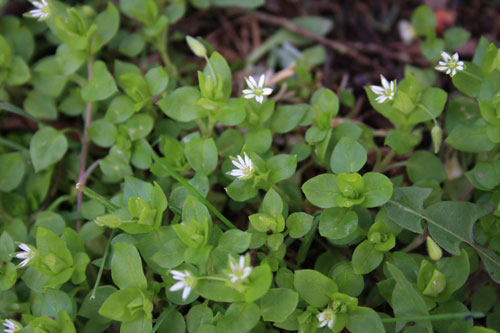
Common chickweed,
Stellaria media.
(*photo
credit)
March 9, 2010 Expose
Affluence Slipping into Bankruptcy
The tautology of the
affluent --
"We get our money
from the gettin' place."
The beggar asks --
"Where is your
gettin' place?"
The affluent reply
--
"Why that's
where we get our money."
The pessimist says:
a society that bails out bankers and allows them to use ill-gotten tax money to
pay bonuses lest the rotten banks cannot retain their "bright" stars is well on
the road to bankruptcy. Such a society fails to grasp the current world
situation. Certainly those who have received their privileged position by pull,
ivy-encrusted degrees and well-greased legislation that allows the retention of
wealth, are "leaders" -- in the downfall of our democratic republic. The very
mentality of a privileged people who cannot see where we are heading is a form
of blindness, which means we could be bumbling our way into the inevitable
downfall up ahead.
The realist asks
whether these pessimistic words are counterproductive -- only if you think the
status quo is good and ought to continue. Change is inevitable, so let's make
the best of it. With our U.S. government spending at the rates now occurring,
we simply cannot continue being policemen of the world and allowing our
billionaires to go on being undertaxed. The optimist may expect inevitable
change for the better. However, the hope of the realist is that, for better or
worse, we shall make changes soon before it is really too late. All the while
there are burdens that have not been fully implemented, namely health access,
proper education and work for all citizens.
Questions flood the
life of the realist: why the unchecked spending for military ventures?
Certainly those in harm's ways ought to have proper provisions, but a more
serious question is: why are they still in harm's way? Why fight in lands
where the people do not want us to be present? Where do vast oil reserves
figure into the foreign policy equation? Why are we at the beck-and-call of
the Eisenhower-coined military/industrial complex? Are not the arms race and
all those military bases throughout the world causing the United States to
travel on a road to bankruptcy?
Our country has been
used to being affluent. I have lived long enough to recall neighbors who
thought the genteel southern traditions still applied to their households; they
were living above their means and simply didn't know it. Had they been
realistic, they would have provided for the future and not lived each day as in
the past. What applied to such households can apply to nations; our country is
no exception. We must live within our means and still provide essentials for
the world's needy.
Prayer:
Lord, teach us to be realistic and to know where we are going and how to be just
in apportioning our limited resources.

Buffalo Mountain wind farm, near Oak
Ridge, TN.
(*photo
credit)
March 10, 2010 Promote
Renewables, Not Nuclear Power
After a brief drop in
electricity consumption (4.72% in the first nine months of 2009, mainly from a
reduction in coal-generated electricity) we may expect that a resumption of past
annual growth rates will reoccur in 2010, mainly through rapid growth in
wind-generated electricity. Two components of the American energy supply
picture are emerging this year: a renewable energy economy is doable and is
coming rapidly; and an expansion of nuclear power facilities is outside of the
economic reality of our nation, and is not worth the investment that recent
legislative proposals are suggesting.
Renewable energy
is making great strides at far lower construction costs than those of new
nuclear power facilities. According to the U.S. Energy Information
Administration (EIA) renewable energy sources (hydropower, biofuels, biomass,
wind, geothermal and solar) provided 10.51% of total U.S. energy production in
the first nine months of 2009; renewable sources also provided 10.21% of net
U.S. electricity generation during the same period. For the same period in 2008
the renewable energy total was 9.18% and for that period in 2007 was 8.72% of
net production. The growth in actual amounts generated came mainly from
hydropower and wind sources. The total renewable energy mix consists of
hydropower (35.16%), biomass (30.72%), biofuels (20.25%), wind (8.17%),
geothermal (4.52%), and solar (1.17%).
Nuclear power is
costly as well as inherently unsafe and comes with disposal problems that have
not yet been solved.
New plants may still cost
as much as nine billion dollars each, though the Koreans are pushing a more
economical light water reactor at five billion dollars. Will safeguards demand
undisclosed cost overruns? Our nation cannot afford these plants, nor really
can the rest of the world. With natural gas fuel costs stabilized, the actual
price paid for electricity from this gas is now equal to and will be lower than
that of electricity generated from nuclear power. This is so even with all the
hidden subsidies by the government, which must bear some of nuclear fuel's
costs: waste disposal, added security and insurance against possible major
calamity at a nuclear powerplant. As solar and wind become cheaper through
lower priced materials, these sources will be competitive with nuclear power
facilities.
If the money to be
used for loans for massive nuclear powerplant construction were shifted to
renewable energy sources, one could expect to meet demand for electricity at
lower prices and more quickly than one can with any return to nuclear powerplant
construction (halted in America since the 1980s). With a combination of energy
efficiency measures along with renewable sources, gaps in the complex energy
supply picture can be filled.
Prayer: Lord,
teach us to use the things we have at our disposal and to use them wisely so
that all may share in the essentials of life.
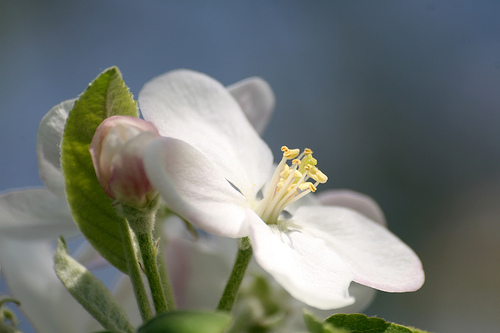
Fresh apple blossom.
(*photo
credit)
March 11, 2010 Observe
Johnny Appleseed Day
Today we celebrate one
of those early pioneers of sustainable homesteading -- John Chapman or Johnny
Appleseed (1774-1845), a frontiersman who planted apple trees throughout the
Midwest, especially in Ohio. My brother Charlie has a thriving apple orchard
near Newark, Ohio, in the precise territory where Johnny plied his trade.
Charlie's apples are disease-resistant varieties guaranteed to have no
commercial chemical residue. Charlie knows what Johnny knew, namely that
apples please all the senses with their exquisite taste, shiny colors, pleasant
aroma, and slick feel. Even the sound of biting into an apple is appealing.
You can't do that with a banana..
In some cultures the
terms "apple" and "fruit" are interchangeable, and the specific apple, while
originating in central Asia, is widely disseminated in all parts of the
temperate globe. In America, the apple is fruit king; American apples come
from heritage types and occur in various sizes, colors and flavors. Each of us
has apple favorites. John Adams liked his apple jack and others like their
summer or fall apples crushed, smashed, squeezed, baked, fried, dried,
distilled, cooked down, or eaten raw. Apples are used for making vinegar,
cider, applejack, apple brandy and apple juice, for flavoring candy and for
being candied, for making stack cakes, apple butter, jelly, sauce, apple
turnovers, cobblers, cookies, and the favorite "it is as American as apple
pie." Picking apples is work for some, and a holiday for others. When frost
was on the pumpkin and the fodder in the shock, it was apple butter-making time
-- second only in popularity to butchering and maple sugaring, but a little less
work at a nicer season. Cider-making was almost a religious rite in New
England.
My apple-related
memories go back -- climbing my favorite apple tree, going to the cellar for
apples in winter, and taking our annual excursion to the Browning Apple Orchard
(owned now by Frank Browning, NPR Paris, France, reporter's family). What makes
an apple popular? First, it has a long shelf-life and defies rapid spoilage; it
grows in various climates; it ships well; it is not overly pulpy and dries
easily as homesteaders know; it is versatile in cooking and baking; it is often
lower-priced than other fruits; it contains vitamins and fiber; and, finally,
people like apples.
There are apples and
apples. Growers strive to produce a perfect specimen; they use chemicals to
ensure that no defects or worms are present and that the appearance is perfect;
but here is where environmental problems arise. In contrast to bananas and
oranges, apple peels are often eaten -- and a mere rinsing will not remove the
agro-chemicals present. Furthermore, purely organic apples are difficult to
grow and are expensive. The low-priced commercial apple is the mainstay fruit
of many. We must go beyond appearance and choose apples wisely.
Prayer: Lord,
apples have been with us since Eden; help us to choose and use them well and to
share them with the "appleless."

View of the sky near Newberry, MI.
(*photo
credit)
March 12, 2010 Proclaim
Air as Commons
The breezes of March
remind us that air is truly earthy in its composition, plentiful, life-giving,
vulnerable, worthy of our protection and part of our shared commons. Because
air is so essential, we all have a right to the highest quality of air
possible; NONE of us has a "right" to contaminate this life-giving substance in
any way. Use of air that belongs to all includes the responsibility for
cleaning up fouled air.
We know that the
atmosphere can be damaged with relative ease. Outdoor air polluting sources
include industry, powerplants and motor vehicles. Industrial air pollutants
from particulates to nitrogen and sulfur oxides have been major air
contaminants. With the advent of coal-fueled, steam-driven pumps and engines
and metal smelters emitting sulfur oxides, modern industry has polluted the
air. Coal and oil-fueled electric generating plants have only exacerbated the
problem. Since we know that clean air is essential, we become aware that people
and other breathing creatures suffer from poor quality air. Victims suffering
with asthma, emphysema, and other respiratory diseases gasp for breath. Many
victims require breathing tubes leading to oxygen tanks as though the fresh air
that was considered so much a part of our world is now accessed, through
commercial enterprises, from oxygen canisters -- and not at major polluters'
expense.
Harmful emissions
from the millions of petroleum-fueled motor vehicles have added ozone, carbon
monoxide and other major contaminants to the already polluted air. Emission
control devices required on current vehicles have reduced this pollution
considerably. Acid rain, resulting from air laden with sulfur and nitrogen
oxides, corrodes monuments, harms vegetation and causes respiratory damage to
humans and animals alike; this acid rain corrodes metal roofs and can
contaminate rainwater.
Indoor air pollution
is a global problem and involves everything from smoking to use of wood, dung
and coal in cooking stoves. These devices are used by between two and half and
three million people; they generate smoke that causes respiratory and eye
problems for cooks and other residents, especially the very young and very old.
Good ventilation and exhaust systems are often lacking where such cooking stoves
are used. The World Health Organization reports that 1.6 million premature
deaths (half children) occur each year due to the use of these defective
devices; these stoves are linked to increased incidence of cataracts, pneumonia
and even tuberculosis.
We cannot trade off
the right to pollute this air. Any person or institution that pollutes has the
responsibility to clear up the air, not continue the practice unattended. As
citizens, we ought to call for clear air as birthright throughout our world.
Prayer: Lord,
teach us to protect our fresh air for all people to breathe deeply and use
respectfully for the common good.

Sharing space in the canopy. Pine
grove in Red River Gorge, KY.
(*photo
credit)
March 13, 2010 Be a
Good Samaritan Day during Hard Times
It is not easy to help
the person who is in the proverbial ditch, but some are there. We can at least
help those who help the person -- and still there is no easy way to bring quick
solutions in so many of the ditched cases. Some are afflicted in more ways than
the injury in the parable, and so we mention suggestions:
Visitation --
Those home-bound, through either illness or old age, can be relieved by a
cheerful visit. They can be buoyed by the good news that their offering of
suffering for specific needs (including one's own) will go a long way to
improving the conditions of our world. Help them see that a cheerful offering
of their own condition is a saving deed when united to the Lord's Calvary event.
Resource awareness
and invitation -- Depressed and abandoned individuals can be invited to
church and to programs that are directed to treatment of an ailment -- AA
programs or drug rehabilitation or smoking cessation. Some who have lost a
loved one need to be introduced to bereavement programs. Sometimes we have to
take the time and go the extra mile to talk with the afflicted person. The Good
Samaritan takes a responsibility on himself or herself -- and this will not be
forgotten.
Continued Contact
-- Prisoners really need our support, both for our friendship here and now and
our help in preparing for the future. Certain post-prison programs are
operative in many parts of the country. Our own contacts through email and
letter-writing allow those who are released to settle and find work.
Being alert --
Some people are particularly skilled at noticing those in the ditch, as the
parable says. Their alertness extends to doing charitable things and being
known so that others come to them for assistance when they have lost a home
through foreclosure or joblessness; the victims could use immediate assistance
but find it hard to beg. Some caregivers are more approachable than others.
Advocacy work
-- Today those who hurt are outside of health and other service areas and are
passed by. We need to pressure governmental agencies constantly to discover and
offer services to those who are voiceless and have little or no political
power. The illegal migrant needs protection; so do those who do not qualify
for certain forms of health care or who need work even if it is lower-wage
infrastructure maintenance or reconstruction.
Homeless and
direct charity -- The poor are always with us, and in these hard times they
seem to be all the more present, if we simply open our eyes and look out. Soup
kitchens, homeless shelters and food agencies need our support and assistance.
Prayer: Lord,
allow us to be attentive to the needs of those who fall by the wayside of our
ever more busy world.
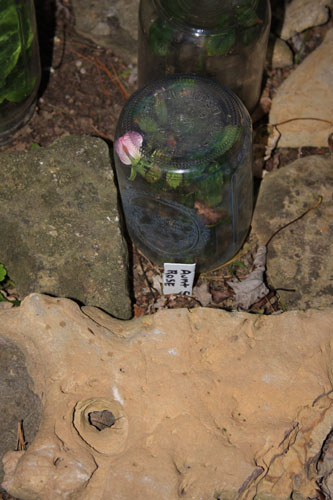
Propagating roses from cuttings, a meaningful
endeavor.
(*photo
credit)
March 14, 2010
Laetare Sunday: Witness against Materialism
He was born blind
so that the works of God might be displayed in him. (John
9:3)
The mid-Lent Sunday
is a day of rose vestments for we find joy amid somberness of life. It is one
when being fully with the Lord involves great risks, and yet is one of great joy
and peace of soul. Of all the passages in the New Testament, this Chapter
impressed me most in my spiritual youth. What honesty and integrity, what
fidelity and love! Today's story is a journey of a blind man to faith -- a
single individual's coming to Christ, and then enduring the persecution that is
to follow. He is not affirmed by his own family who distance themselves and say
he can testify on his own. He is not affirmed by the establishment that
ridicules him for affirming Jesus as healer. He is thrown out of the protective
screen of Jewish religion needed to be within the law of the Roman Empire, where
being ejected makes one an outlaw -- and fodder for the lions.
Many of the saints
stand out as people willing to take great risks and, yet as solitary witnesses,
were to find God's goodness. Examples include St. Thomas More in England, Joan
of Arc in France and Franz Zaggerstadder in Austria. All these gave their lives
in order to witness to the truth. Beyond these are millions who must forego
material excess and witness through sharing with the poor. Let's go beyond
today's singular witnesses and look for those of us blind in our past and now
receiving sight to see what is going on in our world. Today, we must witness
against a system of "materialism" (whether capitalistic or communistic) that
stands ready to destroy our Earth and its people. Many Christians prefer to
accommodate and to go along with this system, afraid of what may follow.
However, even if ostracized and looked upon as overly emotional or lacking in
some type of economic expertise, we must still find here the wherewithal to
stand up and be counted:
Materialism is
the prevailing political and economic system of our day that tolerates and
encourages the escalating of wants by those who enter a higher economic class;
it promotes a massive exploitation of resources in a futile attempt to satisfy
those wants through sequestering resources reserved for satisfying legitimate
needs of the poor. Demonic powers make every effort to lure people beyond
essential needs to a series of wants that will deplete our world's resources and
cause pollution of every sort. This materialism is embodied in a system, where
the wasting and polluting privileged class diverts resources from the needy
through their own selfish and addictive quest to satisfy wants.
Prayer: Holy
Spirit, heal us from our material blindness and give us the courage to resist a
"prosperity christianity" that distracts us from the fundamental sharing of
resources that must occur here and now. Help us expose and speak forthrightly
about the ravages of modern materialism.

A burst of color on late winter forest floor.
(*photo
credit)
March 15, 2010 Be
Acquainted with Tea Parties and History
On the Ides of
March we might consider conspiracies good and bad in our American history.
During the night of December 16, 1773, a group of Boston citizens disguised
themselves as Mohawk Indians; they raided ships containing tea on which duties
were to be imposed, and they threw 342 containers of tea into the harbor. Thus
was celebrated the Boston Tea Party. Some want to imitate that event through
citizen-action that sprang up in our country in mid-2009, and involved holding
meetings throughout the country.
It is hard for fiscal
conservatives to disagree with the modern tea party people. Still we must ask
the question: is the modern party-goers' dislike for our federal government due
in great part to having been propagandized by the very powers who have placed
our nation in such a fix? The modern tea party folks call for the support of
the very ones who caused the weakening of our financial structures in the first
place. Real tea party people ought to be against the imposition of unfair
duties on our people not by distant governments (George the Third) but by
distant privileged modern "Georges" who have absconded with the wealth and
secured it in tax havens in distant lands. Rather than equating
eighteenth-century oppression with our current government, surely they ought to
be loyal to our local and even national government, and focus attention on the
globalized power elite.
Along with our early
American revolutionaries, I believe that a good government closer at home is
certainly better than no government at all. Taxation without representation is
still a good cause and "no taxation" because of political privilege by the
wealthy must be addressed by citizens at all levels. Good democratic government
is far superior to a "nobility of influence" that allows banking interests to
give their bonuses to their confreres because they want to retain them -- and a
number might be better sent behind bars. Our country is outraged and yet,
despite some feeble efforts at reform, the unregulated practices that brought on
the near financial collapse of 2008-09 continue to occur before our eyes. Where
are our regulators? What does it mean to look first to ensure the proper care
of bankers who want to impose duties on citizens and pay little themselves?
Those of us who are fiscally conservative and yet seek to distance ourselves
from the extravagances of capitalism may be a minority, but we must become a
majority in order to save our country and world.
May I propose to the
tea party imitators that they dress in whatever costumes they desire, but go
after the real culprits, the bankers, military industry executives and bonus
seekers who are so privileged that they can pillage the treasury of our country
and make little or no accounting in the process. Dump the untaxed salary
"contracts" in the harbor and call for reform through proper governmental
regulation. Don't be hoodwinked by propaganda.
Prayer: Lord,
help us direct our righteous anger at all times in the right direction.

Grape hyacinths (Muscari racemosum) in March.
(*photo
credit)
March 16,
2010 Thank God for March
Every
month has many things to be thankful for and we can only start to
tap the resources that are available.
Return
of the birds. The swallows return to Capistrano and all the
many migratory birds start winging back from hotter climates to our
advantage. Thanks to the Lord, for they are a blessing.
St.
Patrick's Day. If nothing more, the humor of the Irish does
spice our overly serious world of problems and concerns. Let it be
for a little while!
Earthworms.
In times of spring plowing, the birds would follow the plow and get
there when the worms were unearthed in order to feast on the plenty
of Earth. These objects of feasting work soil.
Sport
Tournaments. The excitement about sporting events is far better
outlet of energy than taking up arms or fighting others. This
sports competition does have its good points provided that all know
that only a game is at stake.
Early
greens. We need to eat nutritious early plants for we lack
sufficient greenery in winter time. Things are growing again.
Daffodils.
These gallant yellow sentinels of spring open the way for us to
enjoy the coming season.
Serviceberry.
Some of the first blooming trees tell us that winter is ending and
we can expect better days ahead.
Breezes.
The cold blasts of an expiring winter remind us of the power of the
wind that is a key to supplying clean, cheap future energy to make
needed electricity.
Wind
generators. The humming sound is not harmful but tells us that
we are committed to clean, cheap energy that is already furnishing
abundant power. Thank heavens, for these are a proper answer to
dangerous nuclear powerplants and dirty coal-fired ones.
The
Lord in our Midst. We need to remember we are not alone in the
struggles that we undertake to save our wounded Earth. The Lord is
with us.
Spring.
We are ever so thankful when it comes.
Psychological
balance. To have reasonably good mental health is a gift worth
special thanks. We have survived the cold weather and are preparing
for the coming months. Balance includes a look at the past as
learned experience and the future as a sign of hope.
Prayer:
Lord, help us extend a ministry of gratitude to all.
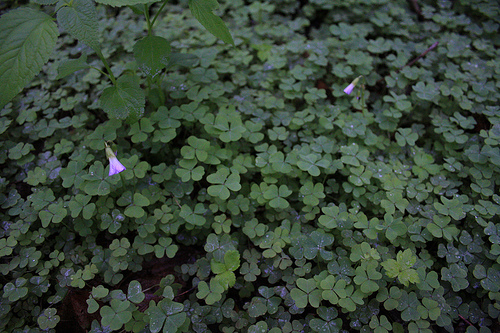
Violet wood-sorrel, Oxalis violacea.
(*photo
credit)
March 17,
2010 Green St. Patrick's Day
Yes,
it is St. Patrick's Day again and I am prepared to celebrate.
However, as a graduate of St. Patrick's High School but without a
drop of Irish blood in my veins, I have a certain ambivalence when
it comes to celebrating the day. I do and do not like to overdo
things, even green things. Yes, green beer is nice today, but one
meal in New York on this day in 1962 (when the cooks dyed all the
food green) was somewhat overdone. Do you enjoy green steak? All
in all, painting the world green took on a special mission with
ecological mandates in vogue. We can eat organically grown foods,
plant edible landscaping and make lifestyle changes with a smaller
carbon imprint.
Some
speak of green-to-gold, those profit-making gimmicks that target the
environmentally conscious. Others of us (see March 10) seek to
confront a "green" movement turning yellow with fear of pressure
from a resurgent nuclear power industry. However, greening can be
serious business. It is good to start a garden but not to use
commercial pesticides or abandon the effort midway through the year
or plant the wrong exotic species. One Santa Clara resident changed
her entire yard from exotic bluegrass lawn to native plants that
grew tall and healthy in the dry climate. Neighbors objected at
first but her humor and good will won, and they began "xeriscaping"
their lawns as well.
Greening
is never perfectly conceived or executed. Garden sites can be
better selected, tilled, planted, and harvested. However, each
novice gardener must not expect perfection to come in one season.
The greening process may require outside assistance. We want to
gather wild plants now that the landscape is in the spring greening
mood. However, some mushrooms are poisonous; some plants are good
for spring greens and others are not. Get the proper information in
order to make greening an entertaining exercise.
Greening
can involve good physical and mental health. Surprisingly, most
regard physical environment as apart from their own lives; but
greening landscape, housing, and waste disposal can become a
community exercise. Why do so few break away and get the needed
physical exercise? Is it because they have ceased being
participants and prefer to be spectators and couch potatoes?
Greening involves holistic health patterns that are balanced
spiritually and physically; greening includes serious and
entertaining activities, smiles and laughs, and jokes and serious
conversation. The mix makes the color green -- provided the balance
does not involve what is overdone or harmful.
Prayer:
Lord, thanks for raising up models like St. Patrick who show us the
need to convert our ways for the better, and even in doing so to
acquire or retain an Irish sense of humor.

An evening hike with a beloved pet.
(*photo
credit)
March 18,
2010 Critique Animal Protection Policy
During the earlier part of this winter, the BBC had a series of
discussions on the manner in which we treat animals, especially in
the light of our food habits and the rapid growth of livestock and
meat production and consumption. In striving to reduce personal
meat consumption, we find that forms of gradualism or incremental
change are not sufficient today. We are facing a rapidly emerging
world that demands fast food burgers and western- style prepared
foods involving large quantities of meat and other animal products.
However, new policies are arising.
Penalties for
animal cruelty are becoming commonplace, with a growth of proper
respect for all animals. A hunter culture had a certain sense of
respect that was damaged by a commercial desire for animal furs and
the subsequent depleting of wildlife. The more radical animal
rights groups consider meat-processing plants as slaughter (a
pejorative term) houses and even relate the practice to that of the
holocaust with people accepting the "open secret" of something
terrible happening that is overlooked; for them it is like going
along with Nazism. The animal rights people speak of ten billion
head of livestock killed each year as part of this uncontested
slaughter -- and say that more humane ways of growing and
terminating the lives of these creatures are inadequate.
Gradualism
is opposed by more radical animal rights groups, because the policy
leads to partial victories that will be accepted as a long-standing
norm. For instance, halting the caging of chickens does not lead to
abolition of chicken factory farms -- only to some modifications
publicized by food chains. The same critique of gradualism extends
to animal research, and especially experimentation with primates
and other specific animals. Opponents of gradualism agree that
partial victories have occurred, but that complacency leads to
retaining modified practices that are unacceptable when it come to
total animal protection.
Vegetarianism
is a wave of the future in a food-short world. Modern scientific
studies show that animal products are not necessary for better human
health. Culturally people show greater dependency on meat products
due to past requirements for fresh flesh and slender food choices at
times of the year. In fact, from a health standpoint, excessive
consumption of animal products today, based on recent cultural
preferences for fast foods, can lead to heart problems, gout and
diabetes and other illnesses as attested by the American Medical
Association.
A
paradigmatic shift in thinking may be required to change current
attitudes towards animals. However, when many people are required
to make major diet changes due to certain health conditions, they
are able and willing. Will animal rights groups succeed to bring
about change through gradual or radical means?
Prayer:
Lord, teach us to radically share the resources of this world and to
do so with animal protection also in mind.

Shiitake mushrooms.
(*photo
credit)
March 19,
2010 Value Forests in Many Ways
Today is
World Forestry Day. We emphasize again the immense value of
forests beyond that of simply furnishing timber to profit-making
operations -- as though gaining a profit is the greatest achievement
of our limited and struggling economy. We need to recall that
forests mitigate climate, retain moisture, store carbon dioxide in a
living storage system, cool the surrounding landscape, and furnish
food and cover for wildlife.
Non-timber
forest products. In our region, forests provide such non-timber
products as papaws, mayapples, persimmons, crabapples, wild
cherries, wild plums, raspberries, blackberries, blueberries, wild
strawberries, cranberries, elderberries, hickory nuts, walnuts,
butternuts, hazelnuts, acorns, mushrooms, lambs- quarters, ramps,
wild garlic, watercress, teas (sumac, sassafras, mint), locust pods,
wild honey, and maple syrup. Exotics such as kudzu are there for
the taking and exterminating if that is still possible.
Sights,
not just products. Furthermore, forests as they stand, and
merely observed or entered for hiking and sightseeing, can add
value, which can include economic consequences due to enhanced
tourism -- in fact, sightseeing is the number one tourist
"activity." Scenic forest vistas are popular attractions for
visitors, and thus cause for employment of lodging and restaurant
workers and police and park attendants.
Climate
modification. The destruction of forests releases about
one-fifth of added carbon dioxide, and thus the reforestation
process is utterly important for climate improvement. Plant trees!
And there is more. Let the forest be! Both of these mandates have
individual and community elements and are worth fostering. But
there is more. Those with public or private forestlands need to
employ resources for the proper management and preservation of these
valuable lands. Judgment calls are different in various regions and
with the condition and makeup of the forest itself. Some need
thinning or replanting or removal of certain exotic species. Proper
forest management is a key to success.
Public funds for forestlands. The ecological value of a forest
for the common good demands that incoming tax funds be directed to
maintenance, policing and reforesting projects. We never give
forests a quantitative value but the actual uncalculated worth of
preservation and enhancement may mount into billions of dollars. If
someone is mounting an operation to remove excess carbon dioxide
from the atmosphere for the good of all, the operation deserves some
reimbursement, especially if it is an unfair burden on a few for the
benefit of the many. Protecting the world's forestland can be paid
for by levying taxes on use of non-renewable, carbon
dioxide-emitting sources such as powerplants.
Prayer:
God, Creator of the forests, make us see both their beauty and their
worth, and take proper measure to protect them.

Hardy hellebore (Lenten rose).
(*photo
credit)
March 20, 2010
Attend to Chores on the Vernal Equinox
With
springtime one could think of a vast array of things to do, but let
us limit ourselves to some, choose to do a few, and encourage
readers to create their own lists.
*
Till the remaining portions of the spring garden spot. Make 2010 a
year for an expanded garden and even enlist the assistance of others
if that is needed.
*
Give a second thought to growing more of the veggies and herbs used
this year. My magic number is thirty, but why limit oneself even to
that?
*
If the weather is right, air out the house. While in the airing
mood, do the same for clothes kept in the closet and surplus
blankets and bedding. Once you have started, the other household
fabrics may need to be aired as well.
* Lent will be
over soon enough so prepare for a spring party with the purchase,
trade or preparation of things for celebration.
*
List household needs in preparation for warmer weather; think of
light bulbs, mild cleaning agents, soap, utility containers,
gardening tools, smoke alarm batteries, camping supplies, and vacuum
filters and bags. Now be prepared to try to find needed items at
the neighborhood yard sales.
*
If you must purchase items listed, how about frequenting spring yard
clearance events? At least, take items to a neighbor's place for
possible exchange or sale. Refrain from adding junk, and thereby
make the decrease of clutter a victory this spring.
*
Consider removing the plastic from sensitive windows and doors (if
spring has nearly arrived in your region) and washing the window
frames and window panes.
*
It is time for spring cleaning and that includes vacuuming rugs,
removing cobwebs, dusting and polishing the furniture and scrubbing,
sweeping or mopping the floors and porch space.
*
Check the car, and maybe this is the day to clean out the interior,
and wash the vehicle to rid it of road grime and salt.
*
Pick some greens such as dandelions if ready for a good start in
this spring season.
*
Prepare a spring reading list and include those
only-partly-completed books.
*
Complete the order for additional trees for this year.
-- Now sit down and rest; don't overdo it.--
Prayer:
Lord, give us the energy to spring into action.

Splash of green on early spring forest
floor. Mercer Co., KY.
(*photo
credit)
March 21, 2010
Reflect upon the Account of the Adulterous Woman
But Jesus
bent down and started writing on the ground with his finger.
(John 8:5)
They brought to
Jesus a woman caught committing adultery, and the condemnation was
for stoning; they were really using the woman as a mere pawn in
seeking to trick Jesus. As a woman she was to suffer while the male
adulterer went free. But here both Jesus and the woman are being
judged in life-threatening circumstances -- but one is innocent and
the other perhaps guilty of the offenses of which she is accused.
The Roman law did not allow Jewish people to inflict the death
penalty, while the inoperative Mosaic law said an adulterous woman
should be stoned. If Jesus says "yes" to the Mosaic Law, he will
defy the Roman law, and if he assents to the Roman law, he disobeys
his religious tradition.
Why does Jesus start writing -- the only scriptural reference to
his performing this art? Some say he is bored by the scribes' and
pharisees' attempts to trip him; others propose that he is writing
the sins of the accusers -- or at least they think he may be doing
this. He says that if there was anyone among the accusers who has
not sinned, he should throw the first stone. They go away,
beginning with the eldest. Does self-righteousness erode with age
as we approach the judgment seat? Jesus is left with the woman; he
does not condemn her, but tells her to sin no more.
First, this is an
argument against the death penalty, not just because on
occasion those convicted have been unjustly sentenced, but because
human judges should not take on the power of life and death. Who
are we to judge? Punishment through incarceration is enough, and
the convicted person may repent his or her ways and proceed to do
good even within prison walls.
Second,
the story shows the mercy of God, for each and every one of
us would find it difficult to hurl that first stone. God has given
us another chance, the time we have here at this moment, regardless
of our sinful past. Jesus asks the woman to repent and live a good
life. This is where mercy takes precedence over justice, and
forgiveness gives way to new life. Jesus is always with us even in
the darkest moments of life.
Third,
Jesus teaches us not to condone the sin while showing mercy to the
sinner. We need reform and ought not to be the first to "stone"
criminals or terrorists. Crimes include the sequestering of common
resources and a failure to share these with people in many parts of
the world -- a form of terrorism in which we participate at least
in a remote way. Modern terrorists commit heinous crimes, and we
condemn the wrongdoing and still love the agent. Reform our lives
both individually and communally, for sin involves all of the human
family.
Prayer:
Lord give us a sense of proper critique in which we do not cast
stones, but rather shower blessings on all.
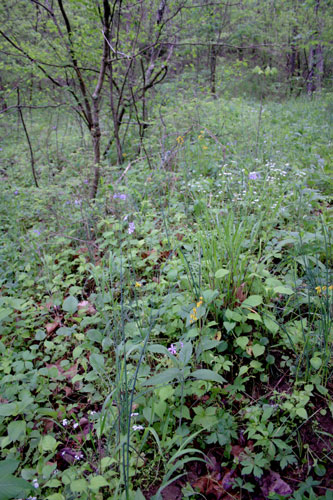
An expanse of spring greenery.
(*photo
credit)
March 22, 2010
Redirect the Contrasumers
While
at Stockholm in 1972, during the first United Nations Conference on
the Environment, I became convinced that individuals could make a
difference and that more than governmental policy and resolutions
were necessary to stop environmental degradation. Technical
solutions to air and water pollution through public and private
agency interplay were needed, but they were not the total answer.
Institutional action had to be balanced by personal change -- thus
the book, The Contrasumers: a Citizen's Guide to Resource
Conservation. Some have urged me to write a sequel, and yet the
book was already too theoretical for me. Action was needed.
Thus
our hesitancy to continue the theme was filled by exploring
appropriate technology. It was a long practical period of three
decades in which we explored and fine tuned techniques for resource
conservation such as those we presented in 99 Ways to a Simple
Lifestyle; they included the techniques in gardening and solar
energy that we promoted at our resource centers and through
Healing Appalachia and Ecotourism in Appalachia.
However, time tarnished the impact of "greening individuals," not
because it could not be done, but because so few would voluntarily
do it. We influenced the choir but not Main Street. In fact, if
the addiction to consumer products is as real as we suspect, it is
virtually impossible to get many rationally-drawn results from the
rank-and-file on resource conservation issues. The elements that
have a direct bearing on the environment, namely, autos, appliances
and spacious homes, are our privileges that we exercise as usual.
Thus
the need is for a new "Contrasumer," but not one who is willing
simply to make rational changes and hope the addicted will follow.
Modern contrasumers realize the limitations of voluntary individual
or community change. However, more radical change has its opponents
as well. Some will call the enlightenment to act, even alone if
necessary, as taking the law into one's own hands -- forgetting that
the wealthy have power, access and influence on lawmakers and have
obtained their ill-gotten gains and taxpayer bonuses through
mischievous behind-the-scenes manipulation of the legislative
process. Authentic modern contrasumers must exercise their civic
duty to save our planet through creative activities.
Terrorists
seem at times to be the only ones who see the power of social change
through destruction of vulnerable sophisticated systems such as
airplanes and motor vehicles. I have argued that the modern
economic system exists on the fragile assumption that the
unemployed, hungry and marginalized will remain in their place while
the privileged persist in destructive activities. Former friends
have taken exception. I now see that the modern contrasumer can
make a difference if the action is non-violent, well-placed and
clearly understood. Publicity is needed, not so much for approval
(celebrity popularity) as for public provocation and reflection --
the mark of a true prophet.
Prayer:
Lord, teach us to be effective witnesses to the Word.

Beautiful spring beauty...
(*photo
credit)
March 23,
2010 Protect from Information Overload
All of us
experience information overload at some periods of time. The only
two world's fairs I ever attended (and even some state and local
ones) produced a sense of information overload. The same thing can
happen if we are going on a tour or to a museum. or even reading a
highly informative book. We begin to sense that modern life
promotes information overload. We hear from experts that the
average person receives twelve hours of information per day (some
double-counted the time through multi-tasking) or obtain an
estimated hundred thousand words a day through ear and/or eye -- a
good-sized book -- via TV, radio, Internet, cell phones, iPods,
emails, conversation, books, periodicals and newspapers. Some of
this comes to the ears and eyes, but never penetrates any deeper.
Selected information is good; overload is bad because selection has
broken down. Some say that for years people have engaged in or
heard conversations all day, and that this has amounted to
information overload without use of modern devices. It is like the
operator of a busy event allowing people to interfere throughout the
event. Thus the phenomenon is not new but it is oppressive when not
regulated -- like the television that plays at least six hours a day
in a home though seldom watched. It is bothersome and makes us
ask: are we selecting and controlling information well?
*
Choose sources well. Certain sources can be omitted. Some
of us non-TV users find TV news is simply overloaded with ads;
others consider many periodicals as too abbreviated to deliver good
information. Others prefer in-depth articles and books as a better
way to get information. A presidential briefing each day is a way
to keep the leader from being overloaded, but it still concedes much
power to the news guardian as prime gateway to information.
*
Cultivate the discipline of intake at specific times only.
Constantly listening to a radio or contacting others by cell phone
is not only unhealthy, but also tends to give us too much
information. When going to a church or entertainment, please cut
off the instant information source. Most events other than
emergencies can wait until you get out.
*
Allow quiet time to reflect and give time to meditation and
prayer -- silence is golden. My lack of a cell phone baffles people
even though I consider the silence to be a prized possession worth
guarding. On occasion we may miss something, but turning off the
cell phone or land phone while sleeping or praying does have a good
effect. More should take advantage of such precious moments.
Prayer:
Lord, teach us to be informed but not overly informed, for so much
of news is really clutter. Help us to discern properly what we need
for these times and to choose our sources wisely.

Learn your local wildflowers. Harbinger of spring (Erigenia
bulbosa), Mercer Co., KY.
(*photo
credit)
March 24, 2010 Commit
Yourself to Ongoing Education
We should constantly seek to continue our education until the day we
die -- and maybe that will continue eternally as well.
Staying a student in
some fashion is needed for the creative person, who learns new
fields, better techniques, and a deepening spirituality. Each of us
should refuse to allow ourselves to dumb down and sink into a regime
of ball games and inane television shows; we must be active, read
more and reflect on what we have gathered in and assimilated.
However, speaking in generalities has limits. Concretely, what do I
do for my ongoing education?
Here
individuals differ considerably. Some professions demand improved
techniques (surgery, horticulture, computer programming etc.), and
thus ongoing education may involve hands-on demonstration and
experience. But many fields and methods may not involve assembling
in one location to interact with an expert. First, transmission
methods allow for Internet or television access and thus avoid the
time- and energy-consuming travel that becomes harder with age. One
admits that social intercourse in a one-on-one situation is most
helpful in some educational pursuits. However, many of us receive
education through personal research, reflection and reading or
accessing information in various ways.
The
educational institutional racket is deeply ingrained in professional
educational demands -- but is it right? Colleges and universities
love to offer courses and increase enrollment in many fields. But
for some people this is not the venue of their own growth in
knowledge. Why should one go to a lecture that could be seen or
heard on video- or audiotapes or found in literature read at one's
leisure? What makes it better to go long distances and endure
unfamiliar lodging when the same could be acquired in one's home at
far less cost? Even personal conversation -- a major learning
device -- could be done via teleconferencing, phoning, or the use of
Skype.
As
long as my eyesight and hearing permit, I am committed to reading a
host of books and periodicals, as well as material on the Internet
and listening to serious programs on the radio. I do not get much
from most lectures and would far rather read what the gifted
lecturer has written. When we consider that note-taking in academic
institutions during the Middle Ages was popular, because materials
and literature were extremely difficult and costly to acquire, we
question the lecture method today. This is especially true when
considering professional education. Just as a mature person need
not make a "preached" retreat, if the Spirit moves him or her
otherwise, so a mature professional person ought to choose the
method of ongoing education as well as the amount of subject
matter.
Prayer:
Holy Spirit, continue to inspire us to continue the learning
process, for this defines us as rational beings, willing to grow and
mature throughout this mortal life. Help others to give us the
space to grow as we deem best.
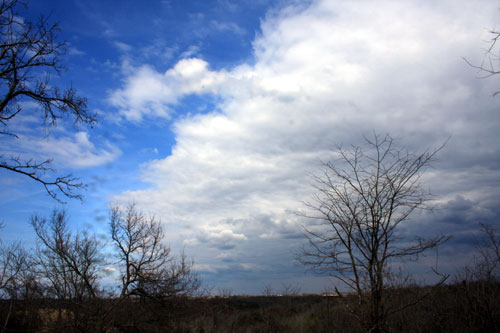
Heaven and Earth meet as clouds clear
from the West.
(*photo
credit)
March 25, 2010
Incarnation: Let Earth and Heaven Kiss
Send victory
like a dew you heavens, and let the clouds rain it down. Let the
earth open for salvation to spring up. Let deliverance, too, bud
forth which I, Yhwh, shall create.
(Isaiah 45:8)
We
each become an incarnation of the meeting of God coming from heaven
and Earth, opening for salvation to spring up. Thus the saving
process comes from two directions, from Earth (on which we live) and
from Heaven (to be our destination). The mystery is deep, for God
has done so much for us. The entire forty-fifth chapter of Isaiah,
from beginning to end, tells of the sovereign power of the Creator.
However, that is only part of the divine mystery no matter how much
we are creation-centered in our spirituality. It is not a complete
mystery without seeing that redemption has occurred, and that we are
invited to be participants within that redemptive act; there is a
cooperative element in which we find ourselves today through the
grace of God.
We
have compassion for our suffering Earth and find, in the act, that
we can do something -- that it is not too late and that salvation
can come through our participative endeavors. If the case is
hopeless, our only final recourse is to call upon God to save us, as
Earth is swept away. However, the Incarnation came in time after
years of preparation; so too do we come in time after much
preparation and education. We are called to spend some moments of
our lives entering in through our work; we join as members of the
Body of Christ in the divine work of salvation, for redemption is
not a past event alone but an ongoing process to which we are
invited.
Heaven
and Earth do kiss because God walks again with the descendants of
Adam and Eve. Distances have been shortened and a transcendent God
is experienced as a more imminent one. If we see the creative hand
of God here and now, deepen our respect for what God has done for
us; we also enhance our respect for the integrity of all creation --
people, plants and animals and the universe itself. The hand of the
Creator is accepted in praise and adoration; the handiwork is
respected as fruit of the Creator. But adoration does not exist in
a passive manner only; if we are truly respectful, we will not
allow anyone to disturb that creation, not because we are distant
from it or near to it, but because to desecrate Earth is to show
disrespect for God the Creator of all.
We
enter into the saving redemptive act because God became one of us,
and as part of the divine family we participate with the risen
Lord. We act as the hands of God in the ongoing redemptive process
and see a renewed world, a new creation, a resurrection-centered
spirituality. Now we spring up, give hope to others, and await the
New Heaven and New Earth.
Prayer:
Lord, help us to see the full impact of the Incarnation event in our
lives as healers of our Earth.
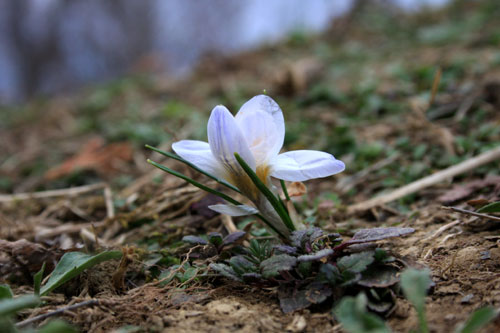
A lone crocus blooms on the edge of
field readied for development. Grant Co., KY.
(*photo
credit)
March 26,
2010 Question "Development"
At
the height of the Cold War nations were divided into "First World"
(western countries allied with us against the USSR), "Second World"
(the Soviets and their allies) and "Third World" or all the
remainder that were normally poorer countries. Later, after the
Berlin Wall fell, divisions were made between "West" and "East," but
that grouped Japan among the poorer portion where, as the second
largest economic power, it obviously did not belong. The "North"
and "South" divisions were also not mutually exclusive. The term
"developed" and "un- or under- developed" is regarded by some
countries in this second category with sophisticated and ancient
cultures as being pejorative. Later "developing" referred to such
nations as China, India and Brazil, since their emerging economies
gave them a special status. Today, "richer," "emerging" and
"poorer" economies give a new threefold division.
In
these groupings of nations "Development" has been regarded as the
height towards which nations ought to aspire. Oddly enough, from an
ecological consideration, our Earth cannot sustain all of this
aspiring "development," for it is simply unsustainable. Authentic
development, as Benedict XVI says in his recent economic letter,
must be life-giving, and some of the free market economies with
concentrated wealth and privilege are blatantly undemocratic.
The
word "develop" means to improve upon, to make better, to become more
systematized. However, a country that will suppress its subsistence
farming, crowd many into urban slums and exhibit rising levels of
unemployment and mass outmigration is hardly on the road to
development. Some so-called developed countries have quite
unsustainable levels of natural resource consumption. These systems
are malfunctioning, not developed; they squander resources at the
others' expense. If less wealthy or politically powerful nations
aspire to such resource use and consumption practices, that does not
mean they are on the road to development, but only accelerating the
unsustainable practices of materialistic models.
Such
terms as "developed" versus "undeveloped" or even "developing
economies" ought to be regarded as indicating the acceptance of a
system that is pejorative of those not meeting certain materialistic
standards. In recent years we have a flurry of designations of
groups or "clubs" of nations, e.g., G-7, G-8, G-20, G-70 and even
G-2. Some lands are militarily powerful; some are more wealthy than
others, and persons rich and poor are the best designations. The
Democratic Republic of Congo is vast but powerless. Somalia is a
failed state with no functioning government for almost two decades.
Placing these with other UN members in a single category is
erroneous. For the sake of discussion we have to make categories,
and so "rich" and "haves," composed of arrived and arriving, versus
"poor" and "have-nots."
Prayer:
Lord, teach us to designate new ways of describing our national
groups so that we indicate the need to redistribute the resources
among the family of nations.

Bobwhite Quail (Colinus virginianus).
(*photo
credit)
March 27, 2010
Celebrate North American Wildlife Day
When I
consider that the nobler animals have been exterminated here (New
England) -- the cougar, panther, lynx. wolverine, wolf, bear, moose.
deer, the beaver, the turkey, etc., etc. -- I cannot but feel that I
live in a tame and, as it were, emasculated country.
Henry David Thoreau
Wildlife in all
its forms is certainly threatened, as Thoreau noted after the long
period of killing for fur and the active hunting of game. He
understood as do we today that we need to protect and celebrate all
animal life: fish, birds, mammals, amphibians, reptiles, and
insects. Wildlife has much variety, but the sheer numbers or
varieties have led in the past to callous disregard for
conservation. We must see these creatures as companions and
co-inhabitants of our limited but sufficient continent. Wildlife
deserve our respect as friends and teachers::
Make room for
wildlife. A neighbor of mine has left standing a rickety old
barn that is almost falling down. However, even though it is a
potential risk to wandering trespassers, he told me that a doe and
fawns winter in the somewhat snug shelter, and he wants to protect
them. I like his caring ways and hope that this care for creation
extends to sanctuaries and bird boxes.
Speak
kindly of wildlife. Vocabulary may help us appreciate wildlife
more. For instance, to "hunt" wildlife sounds somewhat challenging
and sports-wise; to go out and "kill" or worse to "slaughter"
wildlife is maybe even repulsive. A "lair" can be a threatening and
fearful word, whereas a "nest" or "habitat" has a more comfortable
sound. A night "noise" or "shadow" may involve a nocturnal animal
out moving about, not a danger.
Learn
from wildlife. All creatures can become our teachers. if we
only open our eyes, hearts and minds to what wildlife give. Their
example of frugality, cleverness, diligence, companionship, and
loyalty can help us all to grow in love and mercy.
Bless wildlife.
Blessing wildlife can be a group or family undertaking, for all
benefit from wildlife as a community undertaking. Formal blessings
for the survival and progress of our native wildlife have a place as
well, for without prayerful care wildlife cannot prosper with the
widespread environmental threats from deforestation and global
warming/climate change.
Keep
a proper wildlife distance. Skits, movies, story-telling and
songs are worth emphasizing. Zoological gardens have a place, but
we prefer parks where animals roam free. Walks and hikes in the
woods in various seasons could be accompanied by observation of
birds and those animals that come into our range. It is more
important, however, to satisfy ourselves with movies or "virtual
proximity" to many animals that do not like us to trample their
territory. Why must we go to polar bear country when we can learn
how these animals are threatened due to current weather conditions?
Prayer:
Oh Creator of all, the process of evolution, which You initiated,
has given us a wide variety of animals that can be admired. Give us
the energy and concern to protect all wildlife.
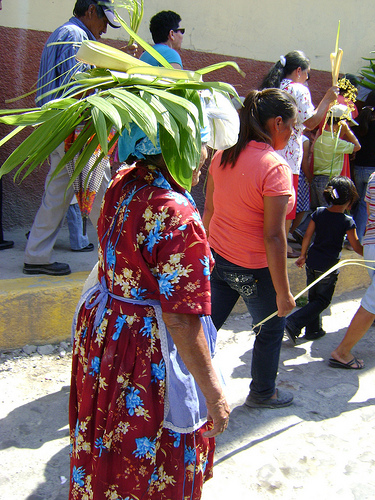
Palm Sunday in a small Honduran
community.
(*photo by John Donaghy, Creative Commons)
March 28,
2010 Wave Palms Thoughtfully
On
Palm Sunday Jesus enters Jerusalem. We realize the risks involved
for he is known as a healer, teacher and prophet. To be known may
mean that people are curious about who he is, for healers are
welcome, teachers are worthy of a hearing and prophets are
provocative. Thus the residents of Jerusalem come out, though it is
uncertain where their allegiances lie. Prophets have a way of
challenging the people who may become resentful about what is
heard. Celebrities are often adulated; models are seen to be
imitated; heroes are quite often welcomed; names of important people
are used by ones who want some of the adulation; people strain to
get within the photograph of someone famous; they are fickle enough
to demonize or canonize people even before they die.
The
questions each of us asks on Palm Sunday are: Where are we? Are we
shouting hosannas to the King? Are we willing to accompany Jesus
throughout the defining week of mission and on to Calvary? However,
on closer look the "we" are so often misled by celebrities who may
prove to be only skin deep in attractiveness, for we do not know the
complete story of each. We are people who easily suffer from
superficiality and name dropping.
Weighing the
call to be authentically Christian is different from going to a
concert to cheer a rock star. Certainly from a liturgical standpoint
it is okay to wave palms, but only if we are committed to sticking
through the ups and down of being a Christian. Today, it is
difficult to profess our faith openly. In our age when fewer
Americans define themselves as Christian, it may be more difficult
to practice what we preach. During Holy Week we ask about our own
practices as individuals and as communities. Do we --
Give praise to
God in many ways and within Creation?
Speak with
respect to and about God and neighbor?
Profess
our faith through attending services regularly?
Honor the just laws of the land?
Become
peacemakers with people and Earth herself?
Support life in
all its forms?
Challenge
the thievery of misused local, regional, national
and global resources?
Bear true
witness to and about others?
Use the Internet
properly?
Refrain from
expanding our wants list of allurements?
This
listing is not exhaustive and so we ask further questions on our own
practices. We know it is easier to parade with palms than to stand
beneath the cross on Calvary. We need not be eternal optimists on
glory days, nor forever distressed at Calvary. We are Sunday or
Resurrection people with our joy and sorrow, victory and suffering,
crown and cross. We need balance in life.
Prayer:
Lord, give us the sense of your glory, but help us know that to
wave palms is not the total picture of life; we must be willing to
take the thorns in stride as well.
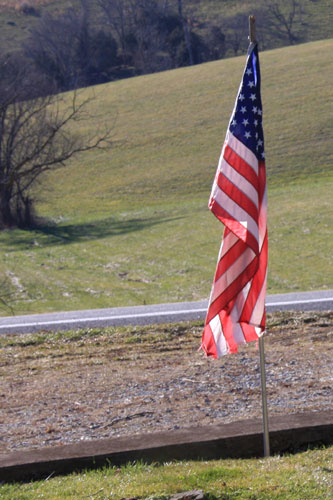
Waiting for March winds to unfurl the
flag.
(*photo credit)
March 29,
2010 Perform Public Acts of Piety
The
archbishop of Westminister urged his congregation to renew a variety
of acts of piety that were performed in the past -- and are no
longer popular in our ever-more-secular society. An act of
reverence indicates that believers acknowledge the need of doing
something extra to show dependence on God, the Creator and Ruler of
all things. This is a particular religious practice, the expression
of which depends on the cultural traditions or habits of the
people. It may be a simple body movement or attire -- bow,
genuflection, wearing a cross; it includes special devotions or
ways of praying over a period of time such as Moslems' daily prayers
or Catholics saying the rosary or making the stations of the cross,
or Protestants' period of prayer before meals with head bowed. Some
general acts of piety include:
*
Salute the flag if in uniform or simply stop and sing along with the
Star Spangled Banner.
*
Defend public acts of piety as spiritually healthy, for these teach
people of all ages respect and reverence.
*
Remain quiet and respectful during times of public tribute to fallen
heroes.
* Extend
respect to all creation -- plants, animals, historic sites, and
common resources.
Piety
is needed by healers lest the caregiving suffer. A good healer is a
pious person, but that piety may express itself in individual and
often hidden ways. Interestingly enough, types of piety vary much
with individual caregivers. Some address others with reverence,
give them special attention, or show concern through hugs and
special acts of kindness. Sick people come to prize these acts of
respect. The sick room becomes a sacred space and giving special
attention to spiritual conversation makes the healer aware of his or
her own limitations and need for assistance in the work ahead. We
cannot do things alone; we need help; we need God's help in the
work being done, especially healing work.
Once
a companion asked someone who signed himself and prayed in a public
place why he did that. "Couldn't you have prayed without making an
act of piety out of it?" The reply was that food was such a gift
from God that some thanks needed to be shown. "Yes, but why
public?" the friend continued. "Because in being public I want you
to know that we all need to give thanks -- including you in your own
way." Granted, this answer may not have been perfect but it came
from the heart and addressed a need for tolerance in manifesting
public acts of piety. One should not be quizzed for doing
something, or for failing to do something public, but tolerance
demands that we give space for public acts of piety.
Prayer:
Lord, give us the courage to manifest public acts of piety even when
others may ridicule them.
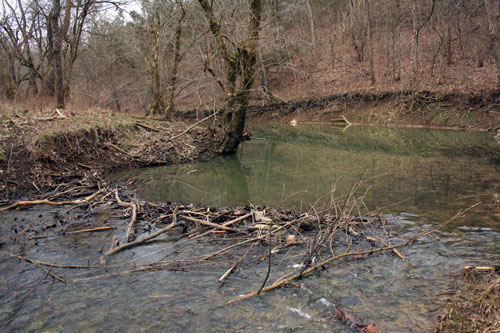
Photo taken on a hike to check on
progress of a beaver dam.
(*photo
credit)
March 30, 20100
Affirm Healthy Habits
Isn't
Doctor's Day a perfect time to talk about healthy habits?
Doctors should promote proper health and not simple attend to those
who suffer from the "horsemen of death": smoking, drinking and
drugs, obesity and lack of exercise (all of which we Kentuckians are
plagued with in one or other fashion). David Frum in an article in
CNN Opinion (12/28/09, "Unhealthy Habits Are What's Killing
Us," gave a listing of shocking statistics on why America with its
costly health care system (60% more per person than other advanced
nations) has a life expectancy that is 29th in the world. Yes, and
we Kentuckians know the four horsemen
Affirmation
comes in many ways. Last year I gave a funeral for a parishioner
who was beloved by all relatives and friends --but died from the
ravages of smoking. In the eulogies after the Mass his close
friends included smoking stories that were humorous enough, but I
wondered why. I still do not have an answer but it had much to do
with them -- they seemed to be affirming that they had survived
risky action but had lost a friend in the fight. Whatever the
motivation, it made me think about how we can affirm good habits?
Certainly our new book, Tobacco Days: A Personal Journey,
seeks to give examples of affirmation for one of the horsemen who is
killing 400,000 Americans and four million worldwide each year.
Perhaps
bad American habits occur because we are individualistic but free
people; we have plentiful supplies of certain substances; we are
prone to overuse God's gifts and this leads to the triumph of the
horsemen of death. Furthermore, within an atmosphere of each being
allowed to do what he or she wants, community actions have only
limited effects. Certainly sin taxes are imposed on tobacco and
alcohol, drugstores and doctors try to limit prescription drugs,
fast food places are required to locate over 200 yards from a
school, and physical exercise (gym) is required of students -- but
communities can only do so much. We suggest certain safeguards
without being intolerant of bad habits.
Stop
advertising medicines and drugs to such an extent that people think
they can make judgments on intake; raise insurance rates for smokers
to help bear the burden of illnesses related to tobacco use; remove
driving privileges from those who drink and drive; and place a tax
on soft drinks so that the consumers of these needless sugar-filled
beverages will help pay the costs of obesity. Families can help
promote good habits by making these something to be imitated rather
than by over-stressing the disadvantages of bad habits.
Individuals, who do not drink and drive; or keep, use and promote
minimal medicines; or who purchase, cook, store and grow healthy
foods; or expect and require smoke-free homes, will go a long way to
reducing bad habits -- and thus enhance the life expectancy of
relatives and friends.
Prayer:
Lord, make us the promoters of good habits, knowing all the while
the devastating effects of bad ones.

Puppy greets visitors from behind secure
fence.
(*photo
credit)
March 31, 2010
Welcome the Census-Taker
If
you are a one-hundred-year-old American or just born today, this is
the day before you will be counted in a ten-year census -- and this
is constitutionally mandated. The United States certainly did not
invent the census, but the process has come to be a valuable tool
for ensuring that national resources are known, assessed, and justly
distributed. The counting has been fairly uneven over time; and,
from early days, when Native Americans went uncounted and slaves
were only counted as three/fifths of a person, we developed a
history of increasing inclusiveness. Today, undocumented workers
and illegal residents are often suspicious of this ten-year national
exercise, and yet census- takers and collectors are bound to
confidentiality in regard to individuals.
Certainly
census-taking is a chore both for the one doing the tabulation (who
is at least paid) and the one giving information. Those of us who
have used census data in researching past residents have discovered
that inaccuracies are often present. I discovered that one person,
the father of a neighbor, was listed with three variations on his
first name for three different censuses -- in 1840, 1850 and 1860.
However, once we accept such discrepancies on ages, income and
education, the cumulative information from a series of censuses
gives a valuable pattern of who we are as a people.
Having
pursued a long-time hobby of compiling the ethnic composition of the
United States, I await the 2010 tabulations. I have all the data
for the states, counties and some major cities in the 1980, 1990 and
2000 censuses. We have the last on this website, "Ethnic Atlas of
the United States." If we live so long, we now want to develop a
moving picture of the differences in ethnic composition with results
from the 2010 census. This may be a wishful goal, but our
computerized version of maps from previous censuses can be
readjusted with the proper care to reflect the changes. The
Hispanic picture has been in such a flux along with the status of
Asians and certain Middle Eastern groups that the results may be
worth presenting to the public.
The
message here is to cooperate with census-takers for they are
striving to do their best -- which is also a patriotic duty. Our
American census is used by government, business, academic and civic
groups for setting priorities and distributing needed services. The
House of Representatives' reapportionment is based on state-by-state
and national totals. Every person ought to be counted for the good
of our welfare as a people. Defend the practice, for we have a
right to be included and our country needs to have all included.
Let's welcome those who have to do the job, and let's make it easier
for them.
Prayer:
Lord, give us the grace to welcome strangers, even those who are
census-takers. Inspire us to spread this sense of hospitality to our
neighbor as well. |